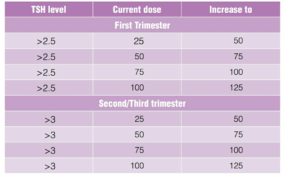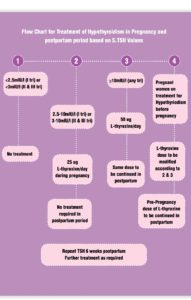 Thyroid disorders are one of the most common causes of endocrine disturbances in the body, with 5-20 times higher incidence in women than in men. Thyroid disease is the second most common endocrine condition encountered in women of childbearing age after diabetes. Moreover, the risk of thyroid disorders increases further with age, during pregnancy, the postpartum period, and menopause.
Thyroid disorders are one of the most common causes of endocrine disturbances in the body, with 5-20 times higher incidence in women than in men. Thyroid disease is the second most common endocrine condition encountered in women of childbearing age after diabetes. Moreover, the risk of thyroid disorders increases further with age, during pregnancy, the postpartum period, and menopause.
How can Hypothyroidism affect Women?
Apart from general signs and systems as that of man, hypothyroidism in women, have
- Delay in reaching sexual maturity
- Irregular menses or lack of ovulation
- Decreased rates of fertility
- If they conceive, the risk of abortion is increased and late fetal demise is increased
Hypothyroidism and Pregnancy
In a woman, pregnancy puts an added physiological burden on normal body functions. In this scenario, if pregnancy is compounded by hypothyroidism, chances of adverse pregnancy outcome for both mother and child are potentiated. In India, the prevalence of hypothyroidism has been reported between 4.8% to 12%
Thyroid changes with Pregnancy
- The requirement of thyroid hormone increases in pregnancy. In Euthyroid pregnant women, production of thyroid hormone increases with pregnancy.
- TSH levels during pregnancy are lower as compared to TSH levels in a non-pregnant state.
- Two hormones: Human Gonadotropin Hormone (hCG) and Estrogen increases thyroid hormones.
- Size of the thyroid gland can be increased, which returns to normal after delivery.
- Iodine is required for formation of Thyroid hormone. Pregnancy is associated with a net decrease in iodide in body
- Autoimmune thyroiditis is the commonest cause of hypothyroidism during pregnancy.
Normal level of Thyroid Hormones
Pregnancy-specific and trimester-specific reference levels for TSH are as follows:
1st trimester – 0.1-2.5mIU/l
IInd trimester – 0.2-3mIU/l
IIIrd trimester – 0.3-3mIU/l
Normal level of Thyroid Hormones in pregnancy
Subclinical Hypothyroidism is defined as a serum TSH between 2.5 and 10mIU/L with normal Free T4 concentration
Overt Hypothyroidism is defined as serum TSH>2.5-3mIU/l with low Free T4 levels or TSH>10mIU/l irrespective of Free T4.
High-Risk Factors for Hypothyroidism
Indian Thyroid Society (ITS) recommends screening of TSH levels in all Pregnant women at the time of their first visit, ideally during pre-pregnancy evaluation or as soon as pregnancy is confirmed.
- Residing in an area of known moderate to severe iodine insufficiency.
- Obesity (pre-pregnancy/first trimester Body Mass Index (BMI) ≥30 kg/m2)
- History of prior thyroid dysfunction or prior thyroid surgery
- Symptoms of thyroid dysfunction or the presence of goitre
- History of thyroid dysfunction in first-degree relative (parents/ siblings/ children)
- History of diagnosed mental retardation in family/previous births
- Known case of autoimmune diseases like Type I diabetes/ Systemic Lupus Erythematosus (SLE)/Rheumatoid Arthritis (RA)/Addison’s disease/Coeliac disease, etc.
- History of recurrent miscarriages, pre-term delivery, intrauterine demise, pre-eclampsia/eclampsia, abruptio placentae
- History of infertility (inability to conceive after one year of unprotected intercourse)
- Use of amiodarone or lithium, or recent administration of iodinated radiologic contrast
How can Hypothyroidism affect Pregnant Women?
- Anaemia
- Muscle pain, weakness
- Congestive heart failure,
- Pregnancy-associated hypertension (pre-eclampsia)
- Placental abnormalities
- Preterm birth
- Low birth weight infants
- Excessive bleeding after delivery.
- Inappropriate weight gain
- Cold intolerance
- Dry skin
- Extreme tiredness
- Severe constipation
- Problems with memory or concentration
- Increased incidence caesarean sections due to fetal distress
Thyroid Hormones and Fetal Development
The fetus has two potential sources of thyroid hormones –
1. Thyroid of own
Fetal thyroid gland reaches its final position by 7 weeks of gestation. Fetal thyroid is capable of trapping iodine by 12 weeks and can synthesize thyroxine by 14 weeks of gestation. Foetus attain adult levels of thyroxine by 36 weeks gestation.
2. Thyroid of mother
Before the foetus is able to secrete its own Thyroid hormone, depends on the maternal supply of thyroid hormone.
Hypothyroid Mother and Baby
- Hypothyroidism can lower mean intelligence, psychomotor, behavioural scores, developmental indices and learning abilities
- Preterm birth or low birth weight, intrauterine growth restriction, intrauterine fetal demise, increased perinatal mortality
- Respiratory distress in the neonate
There are three types or combinations of thyroid deficiency states known to impact fetal development:
If the mother is hypothyroidism:
TSH≥10mIU/l is taken as Overt Hypothyroidism irrespective of hormone levels. Overt hypothyroidism (low T3, T4 and high TSH) in pregnant women does not pose much problem to the baby because it usually is associated with infertility or mother is already aware of the condition. If you had hypothyroidism before you became pregnant and are taking levothyroxine, you will probably need to increase your dose.
If pregnancy does occur, there is an increased risk of intrauterine fetal death and gestational hypertension.
Subclinical hypothyroidism (normal T3 and T4, low TSH) is more dangerous as the mother is not aware of her hormonal status. The most common cause of subclinical hypothyroidism is an autoimmune disease. In these women are found anti-thyroid antibodies which can cross the human placenta and attack the fetal thyroid gland.
Isolated fetal hypothyroidism:
This condition is also known as sporadic congenital hypothyroidism, which occurs in approximately 1:2000 to 1:4000 newborns. It is due to failure of the fetal thyroid gland to produce adequate amounts of thyroid hormone. Most children with this disorder are normal at birth because maternal thyroid hormones are transported across the placenta during gestation.
It is the most common treatable cause of mental retardation but earlier the treatment, better is the prognosis. As time passes by mental capability deteriorates. If treatment is not instituted quickly, the child will become permanently mentally and growth retarded – a disorder called cretinism.
Iodine deficiency – Combined maternal and fetal hypothyroidism:
Iodine is very essential for the formation of thyroid hormone. If the mother is deficient in Iodine, the mother is hypothyroid, consequently, the foetus is hypothyroid too and if supplemental iodine is not provided, the child may well develop cretinism, with mental retardation, deaf-mutism and spasticity. Iodine supplementation is given during the first or second trimester. Treatment during the third trimester or after birth will not prevent the mental defects.
The World Health Organization recommends increasing iodine intake from the standard 100 to 150 ug/day to at least 200 ug/day during pregnancy.
Protocol for management of hypothyroidism as per guidelines of National Guidelines for Screening of Hypothyroidism During Pregnancy, India. This guideline is based upon the serum TSH concentration in pregnant women.
- No treatment is needed if TSH level is :
– <2.5 in the 1st trimester
– <3 in 2nd and 3rd trimester
- – Decrease dose of Levothyroxine if TSH <0.1
- Drug of choice for treatment is Levothyroxine, being a Category ‘A’ drug it is safe in pregnancy and lactation. It is available as tablet form in various strength (25, 50, 75,100 μg) in the market.
- Levothyroxine is to be taken orally, in the morning empty stomach. Do not to take anything orally for at least half an hour after intake of the medicine.
- If a dose is missed on one day, take the same as soon as you remember and do not eat anything for the next half hour.
- If you miss the tablet for the entire day, take double the dose the next morning.
- Women diagnosed with hypothyroidism before pregnancy and on treatment should resume pre-pregnancy doses after delivery. TSH is evaluated after 6 weeks postpartum and further changes in the dosage is done accordingly.
There is a very good flow chart with the guidelines of National Guidelines for Screening of Hypothyroidism During Pregnancy as the roadmap for the treatment of hypothyroidism during pregnancy.
Hypothyroidism after Pregnancy
Postpartum thyroiditis is an inflammation of the thyroid that affects about 1 in 20 women during the first year after giving birth and is more common in women with type 1 diabetes
The inflammation causes stored thyroid hormone to leak out of the thyroid gland, leading to hyperthyroidism, may occur after 1-4 months of delivery and usually persist for 1-3 months. This phase may be followed by hypothyroidism which occurs 4-8 months after delivery and may last up to 9 –12 months. Most women will have the return of their thyroid function to normal within 12-18 months of the onset of symptoms. However, approximately 20% of those that go into a hypothyroid phase will remain hypothyroid.
Risk Factors of Postpartum Thyroiditis?
- Autoimmune disorders (such as Type 1, or juvenile onset, Diabetes Mellitus)
- Positive anti-thyroid antibodies
- History of previous thyroid dysfunction
- History of previous postpartum thyroiditis
- The family history of thyroid dysfunction







